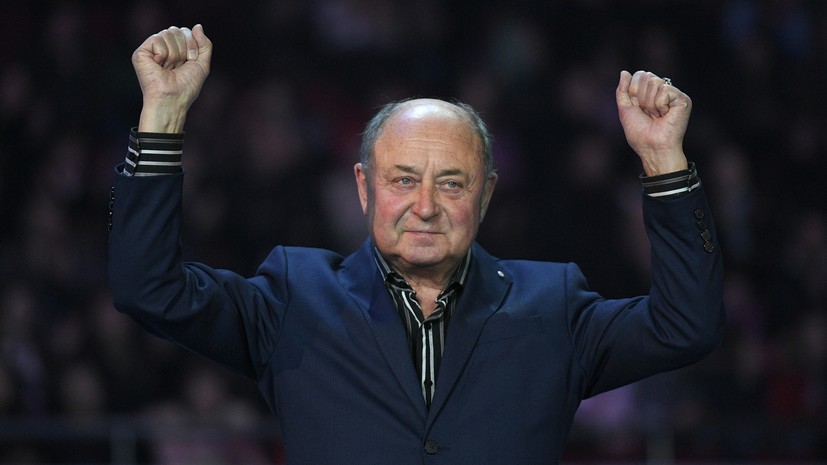One of the varieties of coaching happiness is when people think of you more than once every five years, on duty celebrating milestones.
Milestones are definitely needed.
As Mikhail Zhvanetsky once remarked ironically and pointedly, with whom for many years my colleagues liked to compare Alexei Mishin: “Age makes it possible to be aware of oneself as happy.
First of all, they say something good to you all the time ... "
And yet, it is much more valuable when the work that you have been doing all your conscious life brings a result that you cannot pass by without noticing.
At 65, Mishin achieved the second Olympic gold with Evgeny Plushenko in Turin - the first was won by Alexey Urmanov at the Games in Lillehammer, when the coach barely passed 50. The period that divided the numbers 70 and 75 was crowned with the fact that Alexei Nikolaevich made Plushenko for the seventh time European champion and triumphant team tournament at the Games in Sochi.
In parallel, the little Mishinskaya girl Liza Tuktamysheva went from the winner of the 2012 children's Olympics to the full-fledged title of the 2015 world champion, becoming the first Russian athlete to consistently perform the primordially male jump - the triple axel.
Well, now Mishin is taking three athletes to the World Championships at once and, seeing him at the side, and even more so on the ice during training, no one even creeps into the head of the idea that 80 years is actually a very respectable age.
A couple of years ago, when I tried to get Alexei Nikolaevich to another conversation about figure skating on record, I unexpectedly received a refusal.
“You know, I don’t want to.
I am inclined to believe that I have a fairly good reputation in the profession.
If we now start talking about women's skating, every word I say, no matter what I say, will be turned upside down on the Internet, streams of mud will flow.
Honestly, I'm not ready for this, ”Mishin said then.
With the dictaphone turned off, we then talked with the coach for more than an hour, and he somehow very casually began to talk about purely everyday problems that always remain behind the scenes in the entourage of the coaching profession.
And, probably, they should stay there: after all, you won't complain to the students when you come to training that you don't feel too good to spend a few hours skating.
You just silently put on these skates and go to work.
On the ice, as figure skaters like to say.
You laugh, you joke, you come up with something new.
Age in this regard has no applied meaning: you either can or not.
Mishin can.
It is interesting that, even going through not the most successful professional times, the coach never feared oblivion.
“Sports are arranged in such a way that you are remembered only when you are in plain sight.
As soon as the result disappears, the coach is forgotten.
I know this very well and have always been ready for it.
Not to mention the fact that in his profession he never sank to some very deep, terrible bottom.
My career was more about victories and successes.
And believe me, I won't have any painful reaction even to complete oblivion.
Tamara Moskvina once told me about this: "Lyosha, you and I have already done so much that we can not be ashamed of our life, no matter what we do in the remaining years," the specialist once said.
It's a paradox, but just Mishin himself and Moskvina, who have walked side by side a long sports path, do not at all regard their own coaching life as a kind of professional survival.
“Before, I constantly tried to prove to the world that I am smart, I can train good athletes and so on.
I did a big foolishness when I traveled the world endlessly and gave seminars.
I did not have time to come up with something new, and immediately tried to tell everyone about it.
After all, I was really engaged in real scientific work.
I was constantly measuring something, discovering the biomechanical foundations of certain movements and elements.
And then suddenly I realized that I shouldn't prove anything to anyone.
I just have to work quietly.
I don’t remember which of the journalists asked me: “Aren't you afraid that your colleagues will start saying that Mishin is losing ground?”
I sincerely replied that I do not yet see a coach who would have the moral right to say so ... ”, the coach remarked during his work with Evgeny Plushenko.
The last phrase can only be repeated now, or even better - sculpted in bronze and immortalized on one of the walls of the St. Petersburg "Jubilee".
It was Alexey Nikolaevich who created that single skating, according to the canons of which the whole figure skating world now lives.
Moreover, it continues to be a reference point for a huge number of colleagues in this world.
At first, the coach was even offended, complaining in front of journalists that any of his ideas and developments were immediately borrowed by competitors.
But Mishin would not have been Mishin if he had not been able to find reasons for irony in the irritating factor.
“At one time, Arkady Raikin successfully performed on the stage with miniatures by Mikhail Zhvanetsky, while the author's surname was never mentioned anywhere for many years.
So it is with me: what I came up with is used by everyone, although no one admits it.
My favorite story is how one American woman came to a seminar in Germany, came to a training session and asked me: “Oh, do you also work according to Mishin’s system?” The mentor laughed.
Happy birthday, Professor!

